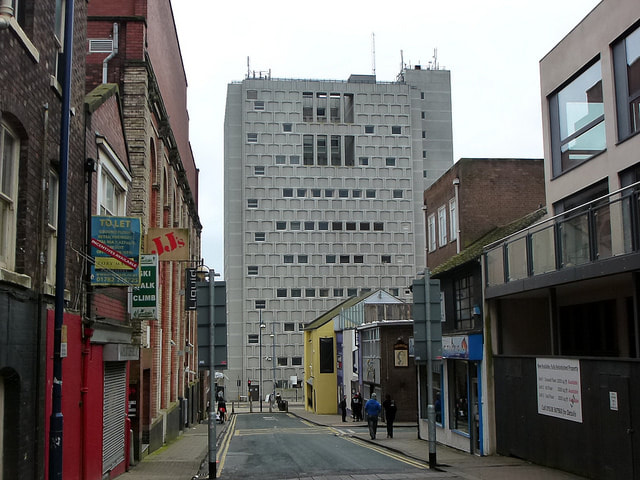|
Brunswick Street, Hanley (Mikey/Flickr CC BY 2.0). The building to the right was for a long time home to Mike Lloyd Music, where I spent much of my time and money. In an idle moment at work the other day, I picked up a recent issue of a high-ranking journal. I knew a few of the contributors, so had a read, and found my own words reproduced. I’d been a research participant a few years ago, interviewed in the home, and long ago lost touch with the researcher. Now the article had finally been published, and I found that it misrepresented me in fairly serious ways, and if it hadn’t been anonymous I’d have been pretty cross. More important, though, this raises questions about how sociological research makes claims to knowledge, how participants’ words are interpreted by researchers, and how it is difficult to understand someone or something without a huge amount of contextual knowledge, something we can’t have now because we don’t have the time.
I am not going to quote from the article, or even provide a reference. First, this is in order to preserve the anonymity of participants. Second, because it would not be fair to the researcher, who only has the spoken words and his own theory of the world to understand it. As you’d expect, the work was on the things I have an interest in – why else get involved? – and covered aspects of locality, class and leisure. The misrepresentations were related to class and local knowledge. The first came in an argument about class that assumed I was a particular kind of middle-class person, and so disconnected from other currents of knowledge and culture. The second was related, in that it was arguing that I’d made a claim of knowledge about the local area that was not true. Because it’s about Stoke, this latter part is what felt most like a personal affront. Indeed, this second argument seemed to have come from a basic misunderstanding of what I was talking about, which can be attributed to the researcher’s shorter-term engagement with the city than my own. So while I talked of the decline of a particular street in town as being a recent phenomenon, the researcher felt I was wrong because to him it had always been full of empty shops.* However, my use of the term recent meant the last two decades, whereas it seems he thought I meant in the last few years. The first argument is much more deep, however, and comes from what is not said as well as what is said. As I’ve pointed out recently, I’m now firmly middle class but certainly wasn’t when I grew up in one of the most deprived neighbourhoods in a very deprived city. So while on the one hand I know have taken on some very middle-class ways, on the other I remain connected – in numerous ways – to the working-class environment I grew up in. Depending on the audience, I have often presented very different faces and in some circumstances I would not talk about any of this. I don’t remember the interview, but I doubt I will have talked about my upbringing or family. What I said in the interview was written up as a middle-class snob, being disparaging of a local working-class culture that I know nothing of, the very stereotype of the privileged not understanding what it is like not to be privileged. When I showed this to friends and family, the response was ‘that doesn’t sound like you at all’. I presume the quotes attributed to me are accurate reflections of the words, although I know from experience that small errors made by transcribers (especially missing words) can make a great difference to the meaning. Even if accurate, though, the quotes are partial. An assessment made on other quotes from the interview would be different. On another day, I might have formulated my thoughts into words differently. From some perspectives this does not matter. If the words were said they were said, and they are part of, and evidence for the way that ‘we’ represent what is going on ‘out there’. So whether the words express my beliefs or not, they can be seen as connected to a societal discourse on class. This, however, makes sociology merely journalism with theory. The research that is funded, the questions that are asked, and the use of parts of the interview transcript are chosen because they fit with sociology’s (and at least part of wider society’s) theories about the way the world works. I’m certain I’m also guilty of this practice too. The problem is, another theory could just as easily be supported by other words, interviews, or individuals. Just as computer algorithms stand accused of taking a problematic social reality and making it solid, so sociology runs the risk of reinforcing its own theories by only using data that supports them. Despite claims of radicalism, some sociology is then deeply conservative as the writing is more reflective of researcher bias than the mess of social reality, and this bias reflects the traditions and backgrounds of the discipline and researchers. So what should be done? There is no view from nowhere, and my biases are surely similar. A plurality of voices may help, as would openness in methods, data and analysis. Mostly, though, we need to pay more attention to context and process, not imagining each individual person, interview or statement as a ‘data point’ (unless under experimental conditions). This, though, would require different methods, somehow holistically seeing the wider picture. Sometimes I think historians have got it right – with a method of read, think, talk, repeat. *Example is changed to preserve anonymity
1 Comment
|
Archives
May 2022
Categories |

